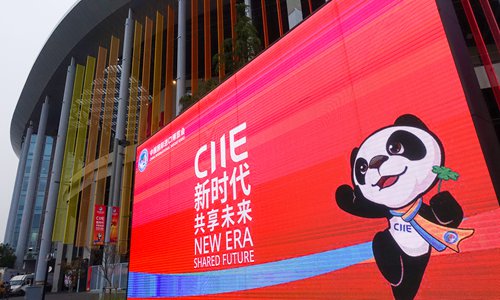HOME >> OPINION
Macron’s China visit sends multiple messages
By Zhang Qian Source:Global Times Published: 2019/11/4 20:18:40

Photo: IC
French President Emmanuel Macron's visit to China and his attendance at the 2019 China International Import Expo (CIIE) underscore the importance of trade ties between the world's second largest economy and a member of the industrialized club of nations called G7.
As one of the 15 guest-of-honor countries, France has a national pavilion at the fair. Since August, the business office of the French Embassy in China has reportedly held regular meetings every week to organize participants to discuss details of their plans for the exhibition. The French government seems to have attached more attention to the expo than expected and French enterprises are passionate about it as well. Why does France show much interest in CIIE?
The reason is simple: China cannot be missed if France wants to expand overseas markets.
First, based on the analysis of bilateral trade between China and France, joining CIIE can increase French exports to China and address the trade deficit. According to Eurostat data, France has had a continuous trade deficit with China from 2013 to 2019. Macron has the issue on mind, and the international platform offered by CIIE could help France export more "Made in France" products to China, increase its export volume and narrow the trade gap with China.
Second, the expo will help China and France expand areas of cooperation. Traditional economic and trade cooperation between China and France spans three fields: aviation and aerospace, nuclear energy, and high-speed rail.
France's high-end clothing, cosmetics, food and wine are renowned in the world, but they account for a relatively low proportion of French exports to China. Through CIIE, France can consolidate cooperation in the traditional fields and in areas it has the upper hand vis-à-vis China. For example, France's silver economy is relatively mature. As the Chinese population ages, there is huge potential for the two countries to cooperate in this field.
Third, France also focuses on selling agricultural products to China. France is the largest agricultural producer in the European Union with its products mainly exported to Europe.
However, French agricultural exports have been dwindling due to persistent European crises and economic downturn. Prices of agricultural products have been falling after the signing of the Comprehensive Economic and Trade Agreement between EU and Canada and a new trade deal between EU and Southern Common Market in recent years.
China banned beef imports from France in 2001 and lifted the ban in 2018. The French government wishes to expand agricultural exports to China seizing the opportunity offered by withdrawal of the beef ban. This year, France will strive to open up China's pork market.
Macron's diplomacy represents the continuation of Gaullism, which is characterized by independent diplomacy. Macron is known to innovate on the theory that is based on the thoughts and actions of former French President Charles de Gaulle. His China policy is two-faced:
On the one hand, France regards China as an indispensable strategic partner. France needs China's cooperation over the Paris Agreement and the Iran nuclear deal after the US' withdrawal from several major international organizations. In addition, France needs the Chinese market and hopes to take advantage of China's expansion of opening-up to the outside world to earn dividends.
France has had an elevated position in China-EU relations due to Brexit and pending exit of German Chancellor Angela Merkel. Fourth, as China's influence in Africa, where France has a strong presence, is growing, the demand for the France-China third-party cooperation in Africa is booming.
On the other hand, France regards China as a competitor. Although China hopes France can have its own stance when dealing with the US, Macron adheres to pro-Atlanticism in its China policy and follows the US.
On Belt and Road Initiative (BRI) for example, though France demonstrated the most positive attitude, it also showed great concerns and took precautions against it. Macron has mentioned "vigilance against hegemony (indicating China)" in public.
Second, Macron pursues a kind of balance in diplomacy. He hopes to balance China's influence in Africa with "French presence" or "European presence." He also talked about the "Indo-Pacific Strategy" when he visited India.
Last, there are obvious ideological differences between China and France. Paris' views on human rights, Tibet, the South China Sea, and Taiwan question are similar to those of Washington.
Nevertheless, Macron's government is cautious and does not touch China's bottom line. Although Macron is criticized as "mercantilist" by the opposition parties in France, he is the person who knows the ins and outs of international affairs.
After all, what Macron wants is to be a leader in China-EU relations rather than being made a scapegoat for a bad relationship with the giant Asian country.
The author is assistant research fellow at China Institutes of Contemporary International Relations. opinion@globaltimes.com.cn
Posted in: VIEWPOINT